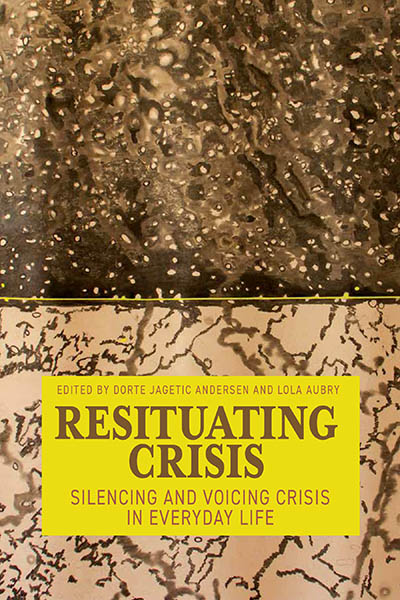New book release – Resituating Crisis
New book release – Resituating Crisis
In their recently published book, editors Lola Aubry (UniGR-CBS) and Dorte Jagetic Andersen (Centre for Border Region Studies) bring together 14 contributions that ethnographically examine and critically analyze contemporary crises and the discourses surrounding them.
Drawing on the expertise of anthropologists, geographers, and cultural studies scholars, the volume offers insights into the situated knowledge and lived experiences of crises and explores ways of being in and responding to crisis, including artistic expressions, political movements, volunteering, and more everyday forms of resilience.
Several contributors are rooted in border studies, offering chapters that explore borders and borderlands as sites of crisis, examine the crisis of the European border regime, and address the lived experiences of crisis among those dwelling in borderlands.
- The UniGR-CBS discussed with the co-editor, Lola Aubry, about the new book release.
-
Together with D. J. Andersen, you have published an anthology on a highly topical subject. What new perspectives on crises does the book open up?
I would identify three main perspectives. First, the anthology adopts a nuanced approach to crises. It goes further than saying that they are destructive and negative. It explores their transformative and critique-inducing potential and examines how individuals and communities integrate both widespread and everyday forms of crisis into their practices. This sheds light on the resilience, adaptability, and creativity of individuals and groups navigating crises.
Second, the book investigates situations where crisis becomes an integral part of normality itself. While the media and politicians often depict crises—such as violent conflicts, pandemics, or forced migration—as disruptions of normality, this anthology delves into what it means to live in a reality where crisis does not merely distort normality but becomes a normalized part of it.
Last but not least, the overall idea of the book is to emphasize the importance of everyday life and situated knowledges in understanding crisis, conceptualizing crisis, and critiquing mediatic crisis discourses. We argue that an ethnographic perspective is essential to move beyond one-sided and pre-established ideas of crisis. By situating crisis discourses in specific contexts, the book enables an understanding of crises as lived, performed—sometimes in contradictory ways—, and mitigated. As Olivier Kramsch aptly notes in his afterword, the book "spatializes" crisis, re-embedding it into specific spaces and places.
Many of the authors' contributions discuss crises in relation to borders and migration. Is there a particular relationship?
Absolutely. Several contributions critically engage with the idea of the so-called migration crisis, as framed by media and political debates. Others examine borders in the context of the COVID-19 pandemic, showcasing the value of approaching crises from the perspective of borders, which helps to resituate the geopolitical in the everyday. This focus reflects the expertise of many contributors in border studies.
At the same time, the chapters extend well beyond borders and migration, addressing crises related to gender, belonging, citizenship, and other themes. These diverse contexts enrich our understanding of how crises unfold and are lived. Importantly, the anthology challenges the focus on highly visible, mediatized crises, encouraging us to consider crises in broader, situated, less conventional, and more ordinary ways.
You have mobilized authors from various disciplines for your anthology. What added value does the interdisciplinary discussion of crises provide?
By drawing on disciplines such as anthropology, geography, and cultural studies, the volume examines a wide range of practices related to crises, including artistic expressions, political movements, volunteering, and everyday forms of resilience.
At the same time, each disciplinary perspective uniquely contributes to achieving two central objectives of the book: a critical examination of crisis discourses and a nuanced exploration of the lived experiences of crises. In other words, the anthology offers a variety of conceptual approaches to crises, compelling arguments for rethinking them, and empirical insights that examine specific crises from critical, decentered and often unexpected angles.
Bibliographical information
Dorte Jagetic Andersen and Lola Aubry (ed.) (2025): Resituating Crisis. Silencing and Voicing Crisis in Everyday Life. New York, Berghahn, DOI: 10.3167/9781805398257.
More information

